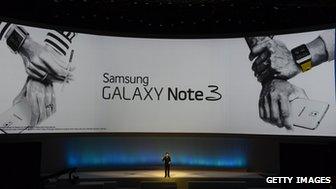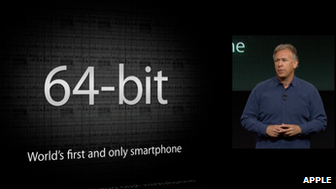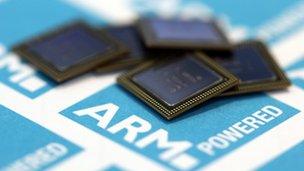Samsung backs Apple's 64-bit chip smartphone chip switch
- Published

Samsung has indicated that the successor to its Note 3 handset will have a 64-bit processor
Samsung has confirmed its next high-end smartphones will feature 64-bit processors.
The announcement follows the launch of the iPhone 5S, the first handset to include the technology.
Apple boasted its A7 chip offered "desktop-class architecture".
However, experts say most apps are unlikely to see much immediate benefit from the shift from 32-bit tech and that it could introduce compatibility problems in the future.
The Android operating system would need to be updated before Samsung's Galaxy devices could take advantage of a shift to 64-bit.
Faster work
The number of bits in relation to a microprocessor affects the size of the numbers that can be handled by its registers - the tiny bits of memory on the processing chip itself. Those numbers are then used to address RAM (random-access memory).
In the case of 32-bit architecture, the amount of memory than can be addressed is two to the power of 32, in other words 4.3 billion values.
In the case of 64-bit architecture the processor can theoretically address 18,400,000 trillion values.
As a result, operating systems written for 32-bit chips can only access up to 4GB of RAM, but those written for 64-bit processors can, in theory, support up to 16 billion gigabytes of RAM.
If a program has been written to take advantage of a 64-bit operating system, it should mean the processor can access data that is in this larger memory rather than retrieving it from, for example, the hard disk.
This speeds up the whole processing chain.
However, including more RAM also makes the equipment more expensive and power-hungry.
For that reason, smart-device makers have tended to shy away from taking advantage of 32-bit chips' upper RAM limit.
Samsung's forthcoming Galaxy Note 3 handset goes the furthest, with 3GB of RAM. The device also features a bigger-than-normal 3,200 mAh battery.
Incompatible apps
Samsung Electronic's co-chief executive announced its plan to use 64-bit chips, in an interview with the Korea Times newspaper.
"Not in the shortest time," said Shin Jong-kyun, external. "But yes, our next smartphones will have 64-bit processing functionality."

Apple dedicated part of its iPhone 5S launch to highlighting its shift to a 64-bit processor
However, bearing in mind there will remain many iOS and Android handsets on the market that still rely on 32-bit chips, this may deter developers from taking advantage of the switch in the short-term.
"People who have the old 32-bit processors will not be able to run software that is built specifically for the 64-bit processors because the latter uses a different instruction set," explained Prof Alan Woodward, from the University of Surrey's computing department.
"However, if people write in 32-bit, it will run on many of the 64-bit processors because they still support the old instruction set.
"So, you can get the whole market by writing the app in 32-bits, but you can only get a very small part of the market if you write specifically for 64-bits."
One solution to this is to use what is called a "fat binary", a program containing code tailored to both types of processor. Apple's Xcode toolset, external allows this to be done automatically.
However, using fat binaries makes apps bigger and they therefore take up more storage space.
Once sales of the new devices do grow, makers of video games and software to create 3D-animations might be among the first to make the switch since their programs are among the most processor-intensive and thus most likely to see the biggest benefit.
One iPhone and Android developer welcomed the move.
"Yes, many apps won't be able to take advantage of 64-bit at the outset," said Stephen Lum from Visual Candy Apps.
"But the beauty of what Apple did is that they said it takes an iOS developer, like me, two hours to convert to 64-bit. That is awesome."
However, one industry watcher warned that the switch might create compatibility problems for devices using older types of chip once developers started releasing apps that only worked on 64-bit processors.
"When app makers do decide to transition to fully 64-bit, it will create a divide in the market," said Chris Green, from the Davies Murphy Group consultancy.
"We saw exactly the same thing happen in the Windows world when software makers moved from 32-bit to purely 64-bit."
Rise of ARM
For now British chip designer ARM may prove the biggest beneficiary.

ARM's shares rose following news that Apple was licensing its 64-bit chip architecture
Smart-device makers are able to offer 64-bit tech because they have licensed the firm's ARMv8 architecture, which it first announced in 2011. The design includes other elements which should also boost processing power.
The news means the company will enjoy bigger fees. ARM's share price has risen about 10% since the start of the week.
Some have speculated that Apple's announcement might foreshadow the US firm ditching Intel chips in its laptops and desktop computers and moving to its own processors.
"Apple's new A7 chip is not powerful enough to be a PC chip, but the architecture is going that way," said Prof Woodward.
"They might be readying themselves. I think this is the beginning of a long road."
- Published11 September 2013
- Published23 July 2013